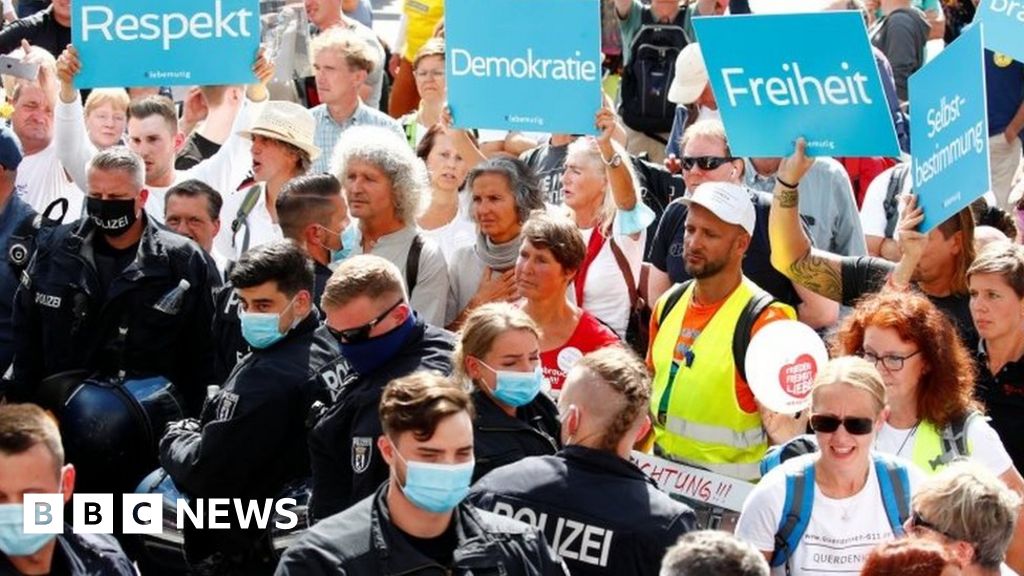
Thousands of people have marched through the German capital Berlin in protest at coronavirus restrictions.
Police imposed mandatory mask-wearing and social distancing - and by midday ordered demonstrators to disperse for flouting the order.
The rally has been mostly peaceful, but at least one person was arrested.
City authorities had tried to stop the march from going ahead, fearing safety measures would be ignored, but a court overturned the ban.
About 18,000 people took part in Saturday's march, police said.
Although Germany has so far not seen the wave of cases affecting some parts of Europe, its infection rate has been growing. New case numbers are reaching highs last seen in April.
What is happening now?
Police issued their order to disperse after participants refused to keep a safe distance from each other, the authorities said.
"Unfortunately, we have no other option," Berlin police said on Twitter. "All the measures taken so far have not led to compliance with the conditions."
Protesters were closely packed in places, and sat together on the ground at one point.
Police said protesters were dispersing peacefully although there were some pockets of unrest.
Live images show dozens people still milling around areas of central Berlin, holding flags.
Who is taking part in the march?
Many of the protesters said the reason they were marching was because fundamental freedoms were under threat from coronavirus restrictions such as social distancing and mandatory mask-wearing.
There were reports of some right-wing groups at the march and one Nazi flag was seen flying, reports German newspaper BZ.
One demonstrator, Stefan, a 43-year-old Berlin resident, told Agence France-Presse: "I'm not an extreme right-wing sympathiser, I'm here to defend our fundamental freedoms."
Another protester told TV station ARD the number of "severely sick" was "trending downward", adding: "At the same time we have more testing. And we have measures that are totally out of proportion. This craziness must be stopped and allow a normal life again."
Counter-protests against the main march also took place, with about 100 people at one rally. "You are marching with Nazis and Fascists," shouted some participants, according to broadcaster RBB.
A similar "anti-corona" march at the beginning of August attracted about the same number of people and was also broken up after protesters deliberately flouted safety regulations.
What are Germany's Covid-19 measures?
The country was one of the most effective in enforcing the framework of response referred to as prevent, detect, contain and treat.
It has been particularly effective in keeping the death rate among the over 70s lower.
It began relaxing physical distancing in early April but continued to track infections, which have seen a rise in August.
On Thursday, Chancellor Angela Merkel and the 16 federal states introduced a minimum €50 (£45; $59) fine for failing to wear a face mask where ordered. A ban on major public events was also extended until next year.
Mrs Merkel said: "We will have to live with this virus for a long time to come. It is still serious." She said it would become more challenging in the winter.
Germany has recorded 242,000 infections, fewer than the other major European nations. Its figure of 9,297 deaths is considerably lower than the numbers in Russia, the UK, Spain, France and Italy, Johns Hopkins University research shows.
https://news.google.com/__i/rss/rd/articles/CBMiMGh0dHBzOi8vd3d3LmJiYy5jby51ay9uZXdzL3dvcmxkLWV1cm9wZS01Mzk1OTU1MtIBNGh0dHBzOi8vd3d3LmJiYy5jby51ay9uZXdzL2FtcC93b3JsZC1ldXJvcGUtNTM5NTk1NTI?oc=5
2020-08-29 12:09:03Z
52781021670055
Tidak ada komentar:
Posting Komentar